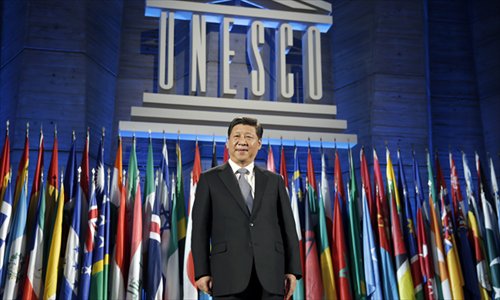China’s new strategic partnership with France to help build multi-polar world

China's President Xi Jinping poses after delivering his speech at the UNESCO headquarters in Paris on Thursday. Xi elaborated his insights on culture and history on the last day of his visit to France. Photo: AFP
China is pinning hopes on a new strategic relationship with France to bolster its relationship with the EU and help build a multi-polar world, analysts said Thursday, after Chinese President Xi Jinping proposed the two nations should always regard each other as a "preferred strategic partner."
Xi made the proposal at a meeting with his French counterpart Francois Hollande in Paris on Wednesday.
At the meeting, the two leaders agreed, by standing at a new historical starting point, to open up the new era of a close and enduring China-France comprehensive and strategic partnership.
"Preferred strategic partner" is a new term to describe bilateral relations, said Zhao Chen, a research fellow at the Institute of European Studies under the Chinese Academy of Social Sciences.
"It contains the Chinese government's hope that improved Sino-French relations will make a difference on the global political stage," Zhao told the Global Times.
In 2004, China and France became comprehensive strategic partners from comprehensive partners when former president Hu Jintao visited France.
Zhao said that while Germany is no doubt China's largest trade partner in Europe, France has more potential to play a bigger role with regard to political cooperation.
France was the first major Western power to establish diplomatic relations with China 50 years ago.
"French people have shown that they are independent and have the political courage and vision to speak up for themselves," Zhao said.
France stood against the US-led invasion of Iraq in 2003 and Jacques Chirac, then French president, called for an end to the arms embargo on China in 2004.
However, his successor, Nicolas Sarkozy, followed the US closely and Hollande has so far showed little determination to be more independent, Zhao noted.
"Beijing hopes France will push for EU recognition of China as a market economy and lifting the EU ban on arms sales to China, which are long-existing barriers between China and Europe," Zhao said.
According to a mid- to long-term blueprint for the development of bilateral ties released following the meeting, the two presidents will continue to meet each year, and exchange ideas on major bilateral and global issues of common concern at multilateral events.
Also, Beijing and Paris will jointly respond to such challenges as terrorism, weapons of mass destruction and their delivery as well as cyber security.
Meanwhile, the two countries will strengthen dialogue on Africa to assist African nations to achieve stability and development of the continent, the blueprint said.
Zhao noted that China has expanded economic interests in Africa, where France retains huge influence due to its colonial past and still has military bases in the continent. Therefore, cooperation with France would to a large extent help protect China's interests in African nations.
In addition to political cooperation, one of the major achievements of Xi's three-day state visit was the multibillion dollar deals inked by the two sides, as France is eager to get a bite of the market in the world's second largest economy.
The two leaders oversaw the signing of 50 deals worth over 18 billion euros ($25 billion), including an order for 70 Airbus aircraft worth more than $10 billion, AFP reported.
The order covers the purchase of 43 mid-range A320 planes and 27 long-haul A330s.
A new 10-year agreement was also signed to allow Airbus to extend a deal to assemble A320 planes in Tianjin to 2025, so as to turn the facility into the Asian center for Airbus.
The two leaders also welcomed the efforts of Chinese and French banks to develop the offshore yuan business in Paris.
The first offshore yuan market in the Western world will be set up in the UK in late March, but China also needs Paris to push offshore yuan deals in the eurozone, Hu Ronghua, an expert on the French economy with Fudan University, told the Global Times.
Xi also pledged to increase imports of agricultural products from France.